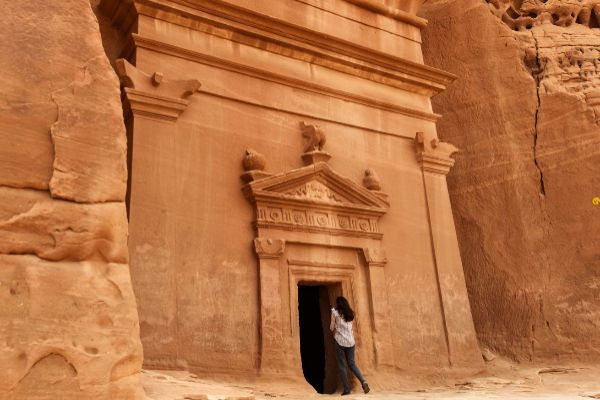- Social change: Saudi Arabia: a revolution without turning back
The impressive Nabatean tombs of Mada'in Saleh, the futuristic city of NEOM or the endless palm oasis of Al Ahsa can be visited from this Saturday. Saudi Arabia opens to tourism for the first time , in a historic decision that will transform a country so far surrounded by a certain secrecy. From now on, people who want to visit the country can apply for a tourist visa through a website in a process that will take them less than 30 minutes.
The new telematic visas can be requested by citizens of 49 countries, among which are the members of the Schengen area of the European Union -including Spain-, the United States or China . They cost a little less than 110 euros (VAT separately), with medical insurance included and are valid for one year, with multiple entries and a maximum duration of up to three months of stay. Tourists from other countries not included in the telematic program may also apply for a visa at embassies and consulates.
"It is a historic day for Saudi Arabia: for the first time we open the doors to tourists from all over the world," said Saudi ambassador to Spain, Mansur bin Jalid al Saud, during the presentation of the new electronic visa this Friday in Madrid. "Saudi Arabia has five places listed by UNESCO as a World Heritage Site " that will now be accessible to the general public, he added. "It's a new chapter in our history," he concluded.
Pack your bags: bikinis and alcohol
Until now, Saudi Arabia was one of the most inaccessible and unknown countries . But this is going to change from now on and it is not only the fact of being able to obtain the electronic visa for tourism, but to this are added details that make the trip easier and more attractive. Although the kingdom, cradle of Islam, is known for its strict social conservatism, visitors will not be asked about their religion or sexual orientation . It is only recommended to observe a minimum decorum in public. No one will ask for the marriage certificate. "Unmarried couples can visit the country freely and can share a room," the authorities say.
Women are not obliged to wear veils and abaya (black tunic that covers clothes concealing the body), they say, although they are condemned to "dress modestly." To men too; that is, no shorts in the street. Can you imagine wearing a bikini where it was previously required to cover yourself completely? It will be possible, but to some extent: only in beaches, swimming pools, spas and private resorts. Never in beaches or public places.
Alcohol consumption will remain illegal in the country and it is not foreseeable that the tourist opening will change this point. The Saudi authorities comment in this ingenious manner on their position: "Saudi Arabia offers a unique and authentic experience that is consistent with local customs and culture. Explorers, culture enthusiasts and adventurers will be able to enjoy it without alcohol."
The country's opening to tourism is part of the 2030 Vision , the strategy designed by Saudi crown prince, Mohamed bin Salman, to transform the economy and society of the kingdom. According to the plan, the tourism sector is called to contribute to the process of converting an oil-based economy to a diversified one. Riyadh expects the sector to go from representing 3% of current GDP to comprise 13% in 2030, and create a million new jobs , as Al Saud has revealed.
According to the criteria of The Trust Project
Know more- Saudi Arabia
- Spain
- UNESCO
Middle East United Arab Emirates, the next target in attacks against oil facilities
The Saudi prince to Trump: Saudi Arabia has "will and ability" to respond to the Yemeni attack
Politics Pedro Sánchez, four days in New York to start the 10-N election campaign

